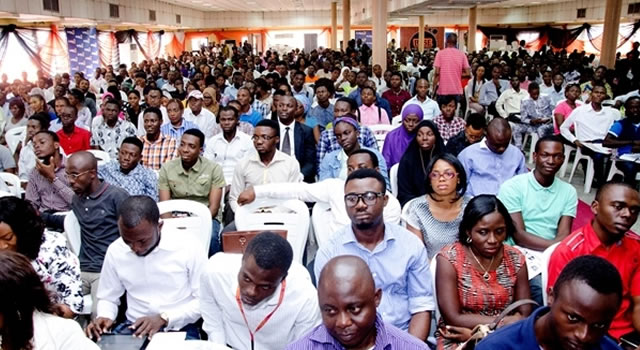Metro
UN, govt others brainstorm on how to harness Nigeria’s huge youth population

High-level experts from international donor agencies, government and the private sector in Nigeria are working towards establishing a synergy in a bid to harness the demographic dividends in Nigeria.
According to the United Nations Population Fund (UNFPA), demographic dividends portends the economic growth potential that can result from shifts in a population’s age structure, mainly when the share of the working-age population (15 to 64) is larger than the non-working-age share of the population (14 and younger, and 65 and older).
Currently, the bulk of the country’s population is young, and the country is characterised by high dependency ratios and unemployment rates. Accelerated changes in this age structure, and decline in the dependency ratio could result in potential economic growth and human development called the demographic dividend, which would result in increased labour incomes and savings.
With the recent outburst by Nigerian youths following the alleged comments made by President Muhammadu Buhari about youths in Nigeria being dependent and lazy, the delegates have mapped out areas that need to be addressed in order to achieve a more inclusive youth group in socio-economic development of the country.
One key area identified by international agencies is the important role private sector has to play in bridging the gap before 2030.
Country Director of the United Nations Information Centre in Nigeria, Ronald Kayanja stressed on the importance of supporting the private sector so that education and health can be better addressed.
“The population of youths in Nigeria is not a problem, it is an opportunity; We want to emphasize that it is not just the role of the government, international agencies but the private sector that are to provide programs and activities that will benefit the young people, empower them, employ them, so that the energy that the young people have in this country can be productively used”.
“The framework agreed upon by the United Nations and the Government of Nigeria is to implement activities in Nigeria and one of the components is the demographic dividends, because we know that if we don’t deal with the element of the youth employment, we cannot spur this country to the development we want”, Kayanja noted.
With regards to the rapid growing population in Nigeria, Country Director of Population Council, Dr Sylvia Adebajo expressed concerns over control, suggesting that adequate planning can help people to be more productive.
Read also: NNPC Appoints Kyari as Nigeria’s OPEC Representative
“The population of Nigeria is increasing rapidly and we must find ways of controlling the population growth, not necessarily by enforcing anything, but that people have a choice on the number of children they want and when they want through child spacing. We need to control the rate at which the population is growing so that people will be more productive, save money, live longer, better quality of life and expectancy, and how can we achieve that? A lot of our resources in Nigeria are donor-dependent and how can we feel this gap? It’s by engaging the private sector because there is a lot they can contribute in all the sector of the economy”.
Dr Diene Keita, UNFPA representative in Nigeria who was represented by Osaretin Adonri, the Assistant representative of the UNFPA insisted that adequate data can help in achieving demographic dividends and with the issue of conducting another population census remains unresolved.
“In everything we do, Data is important, even at the micro level, for a long time, we do not know how many we are in Nigeria, we are not sure, we have been using the population projection which to some extent, is good but we need accurate population of this country to plan”.
“For us to open the window towards demographic dividends we must first start with creating the population structure where more people are working and less people dependent which involves planning, and that is where family planning is important”, he added.
For the private sector, Omobolanle Victor-Laniyan, the Head, sustainability, Access Bank believes investment in health still remains crucial to achieving demographic dividends.
“We need to be deliberate; Demographic Dividend is a deliberate thing that needs proper planning, investment and harnessing the dividends. Quite a number of organisations have been making a lot of efforts to invest in youths; we just need to ensure that the youths are confident in themselves and their ability to drive the economy forward”.
“To stem this tide, we need a lot of collaboration from the public and private sector with similar values. Sustainability should also be key because we are investing in people; the health connection in investing in people is crucial because if they are healthy, they will be able to live into the long time future and your investment will be sustained. But if you invest in empowerment and not health issues, you might stand the risk of losing out on your investment, so it has to be holistic in your approach”.
RipplesNigeria… without borders, without fears
Click here to join the Ripples Nigeria WhatsApp group for latest updates.
Join the conversation
Support Ripples Nigeria, hold up solutions journalism
Balanced, fearless journalism driven by data comes at huge financial costs.
As a media platform, we hold leadership accountable and will not trade the right to press freedom and free speech for a piece of cake.
If you like what we do, and are ready to uphold solutions journalism, kindly donate to the Ripples Nigeria cause.
Your support would help to ensure that citizens and institutions continue to have free access to credible and reliable information for societal development.






















